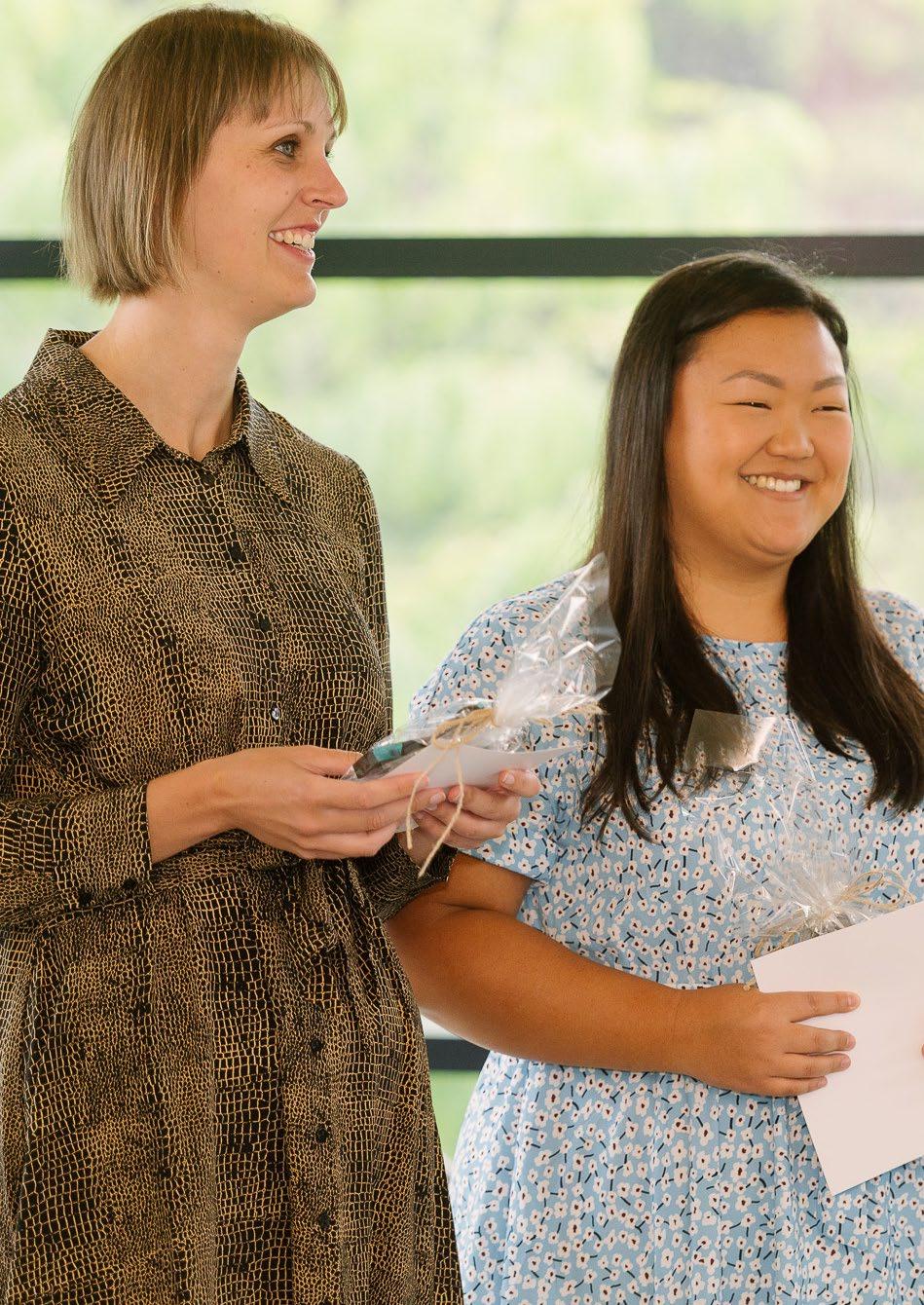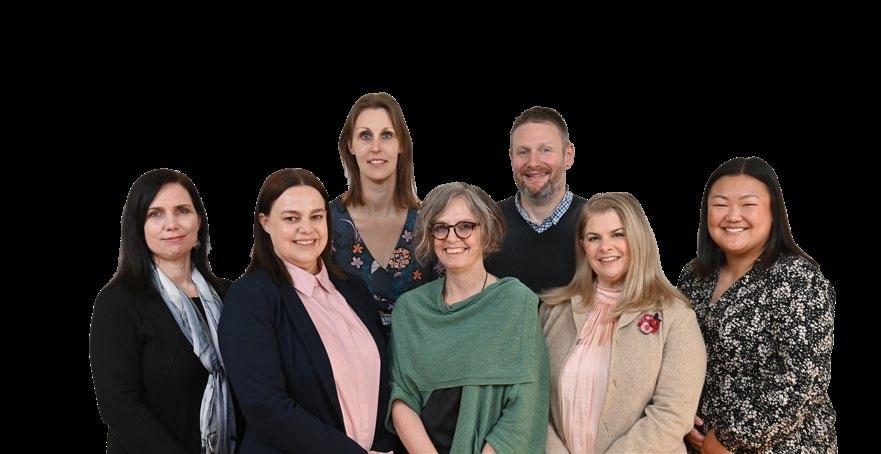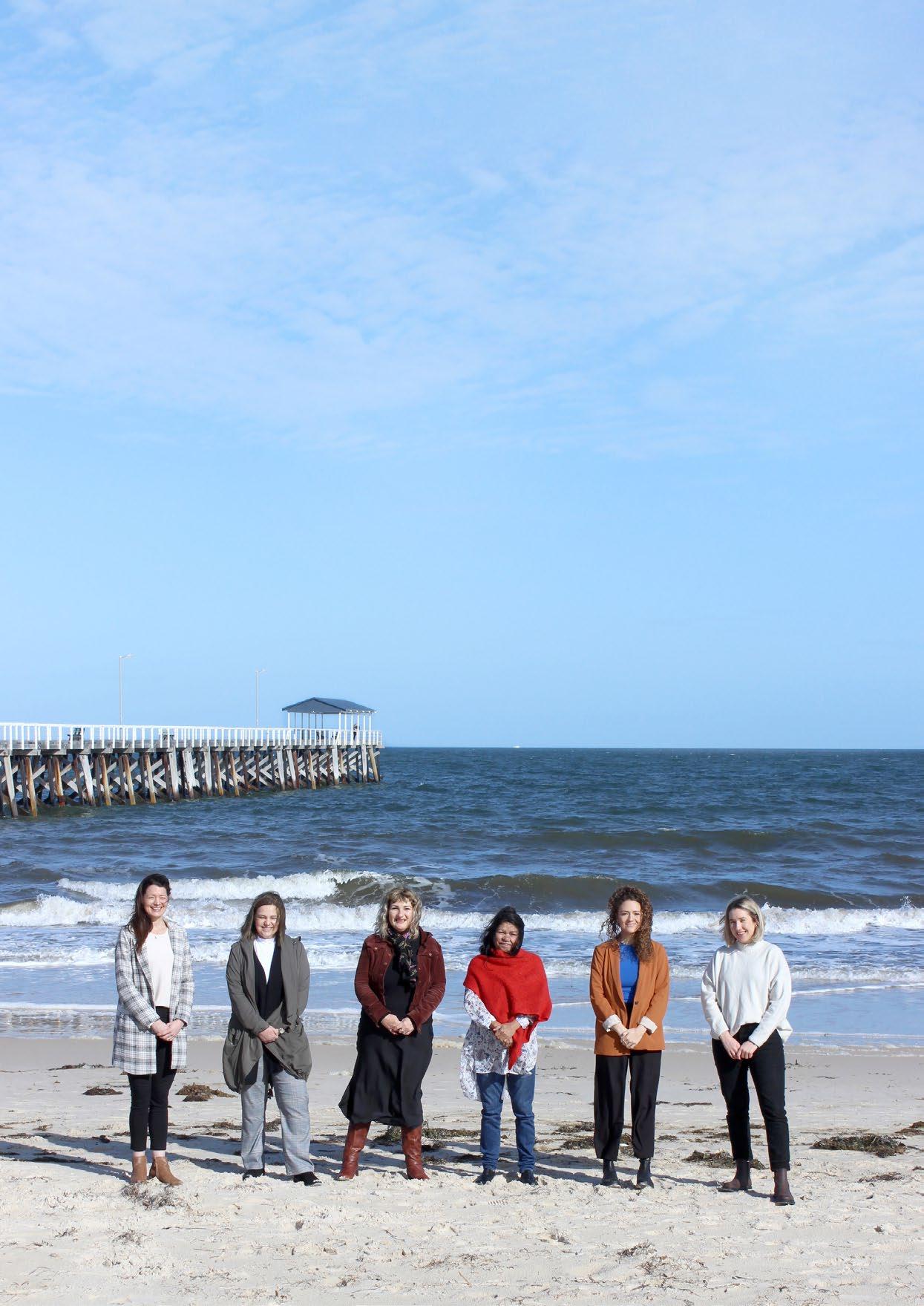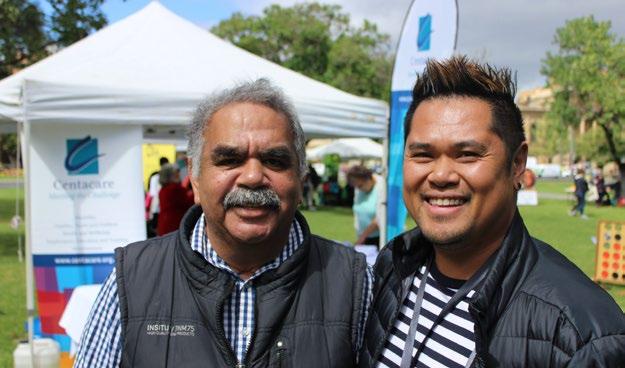
7 minute read
Children's Services Unit
Holistic, therapeutic support for families
We walk alongside families and support them to increase their parenting capacity and toolkit, through trauma responsive practice, therapeutic attachment interventions, and building identity and agency.
This year was a period of consolidation for Children's Services Unit (CSU), with a new program integrated into the unit, re-contracted programs transformed, and existing programs strengthened.
Families with children at risk of disruption were supported by RESTORE Intensive Family Services, with the North team establishing a base at Emmaus House, Salisbury. The site underwent extensive renovations, including the addition of gender-neutral toilets, and now houses our northern parenting programs.
Unify Reunification Services adapted to a fee-for-service model, with the therapeutic framework firmly embedded.
Breathing Space, a pilot program to support young women who have experienced the removal of a child or children from their care, underwent an extensive evaluation process (see separate story), and new branding was developed for early intervention programs, Kids In Focus and Dad's Business.
Centacare Foster Care continued to record significant growth, ensuring children under Guardianship orders have safe, stable and nurturing homes.
Across CSU, staff demonstrated adaptability, resilience and innovation in their support of families who carry the burden of unprocessed trauma and limited experience of secure and cooperative relationships.
The client's voice, which is at the heart of Children's Services and is acknowledged in data reporting, continued to shape programs and inform service delivery. Key CSU highlights:
• A Catholic Charities grant was used to build a playground, verandah and fence at Emmaus House, as well as supporting foster carers with backpacks full of ageappropriate emergency supplies for children placed in their care. • Three staff and two foster carers were named finalists at the inaugural Child Protection Awards: Dr Jackie Amos and the reunification team were recognised for Excellence in Child
Protection Research and Centacare; foster carers Bindee and Karen were nominated for the Aboriginal and Torres
Strait Islander Child Placement Principal Award; Eric Cruz took out the Media Award and Les Wanganeen was named
Kinship Carer of the Year (see separate story). • Further implementation of the therapeutic framework across Children's Services in the training space, with four staff accredited as Therapeutic Crisis Intervention for
Families trainers. Narrative Exposure therapy and Safety,
Playfulness, Acceptance, Curiosity and Empathy training was also rolled out across the unit.
In addition to our dedicated workforce, I would like to acknowledge the outstanding leadership of Leanne Haddad, who oversaw CSU from 2017 before being appointed Deputy Director in early 2022. Leanne constantly strove for service excellence to create quality outcomes for the families and individuals we are privileged to walk alongside.
Amalie Mannik Acting Executive Manager
Centacare's role in breaking the cycle of intergenerational trauma https://bit.ly/3QUx5Ld

Building a strong support system
Breathing Space is filling a service gap for young women whose support needs are largely disregarded after child removal, new research shows.
An evaluation of the pilot program, published in June by Centacare Catholic Family Services and the Centre for Social Impact at Flinders University, recommends a scaling up of Breathing Space to allow more women to be supported.
The research details how the 18-month intervention delivers significant benefits across multiple life domains for participants and is associated with improvements in wellbeing, parenting capacity and self-determination.
In particular, the evaluation notes that four of the 12 participants who sustained engagement with Breathing Space were reunified with their children during the intervention, and reunification was at least partly attributable to the program's supports.
Launched by Centacare in late 2020 and funded by the Department of Human Services, Breathing Space works with women aged under 25 years who have experienced removal of a child or children from their care and are therefore at heightened risk of recurrent removal in the future.
The trauma-responsive therapeutic intervention – believed to be an Australian-first – delivers holistic, wraparound supports for women who have high complexity of need and present with a wide range of challenges.
Most participants have a history of trauma dating back to their own childhoods and have themselves spent time in out-of-home care placements as children. Author, Research Fellow Dr Veronica Coram, highlights how Breathing Space benefits women, children and society more broadly by reducing out-of-home care and child protection costs for government while keeping children with their parents where they are likely to achieve better long-term outcomes.
"Enhanced parenting capacities were related to other improvement in the lives of Breathing Space participants, including a strong sense of self, greater resilience and coping skills, and feeling empowered to make better decisions for themselves and their children," writes Dr Coram.
Key factors supporting Breathing Space's positive outcomes for participants include "strong trusting relationships with staff, a traumaresponsive approach, integrated wraparound supports delivered by a multidisciplinary team, flexibility and responsiveness to individual need, and intensive therapy to unpack trauma."

Unifying families with heart
Unify Family Reunification Services was launched in July 2021 for families who have been separated by the child protection system due to safety concerns.
The service supports parents to make life changes so that children and young people can return home and live safely in their care.
The Unify model recognises intergenerational trauma as a fundamental cause of most child abuse and neglect and addresses this with flexible therapeutic interventions to achieve sustainable change and minimise the impact of trauma on future generations.
The service continues the excellent work of Centacare's previous Reunification and Adolescent Reunification Pilot teams.
Underpinned by a therapeutic framework – based on the research and work of Centacare Lead Therapist Dr Jackie Amos – Unify maintained a high success rate this year, while operating with reduced staff resources and navigating a change to fee-for-service funding, requiring new systems and processes.
In May, several members of the team were successful in having two case studies published in the Australian and New Zealand Journal of Family Therapy. The paper documents the use of Adult Exploration of Attachment Interview in achieving reunification.
This trauma-responsive therapy is used to explore how parents' experiences of trauma in their childhood can impact their parenting out of conscious awareness. This can empower parents to use their learning as a resource for change.
Manager Sam Carpenter said Unify's success was driven by two key factors – a clear set of principles and team cohesion.
"Unify is made up of a very brave and strong group of people," he said.
"Taking on this work every day takes a lot of yourself. Bearing the burden of a person's trauma and responding with empathy and hope for the future, while balancing the needs of children in the care system, takes more than learned professional skills – it requires true heart."

Centacare recognised in Child Protection Awards
Centacare staff were applauded in the inaugural SA Child Protection Awards, announced in September.
Aboriginal Cultural Consultant Les Wanganeen was named metropolitan Kinship Carer of the Year for his role as sole carer of his cultural grandson.
Eric Cruz took out the Media Award for the Circle of Care campaign, which he developed in his role as Foster Care Assessment and Recruitment Officer.
The duo was among a raft of Centacare faces nominated for recognition in the Awards which attracted more than 200 entries across 12 categories.
Les had been planning on retirement when he became a kinship carer five years ago, driven by a determination to keep his then-newborn cultural grandson connected to family, Country, culture and community.
"Cultural connection is about linking children into the bigger picture and establishing their place in the kinship structure," he said.
In raising his cultural grandson, Les has drawn on a lengthy career in child protection and has been able to uphold the ATSI Child Placement Principle.
The Principle recognises and protects the rights of Aboriginal and Torres Strait Islander children and families and increases their level of self-determination.
Eric was applauded for the successful Circle of Care initiative, developed to raise awareness and understanding of the diverse types of foster care, and the reasons children come into care.
Eric partnered with Quisk illustrator Denham Haynes to create the campaign which puts children at the heart of a circle of care and highlights the role of foster families in giving them safe and loving homes.
Delivered by the Department for Child Protection in partnership with the National Association for Prevention of Child Abuse and Neglect (NAPCAN), the annual Awards celebrate the achievements of individuals, organisations, family-based carers and volunteers who provide vital support to vulnerable children and young people.









